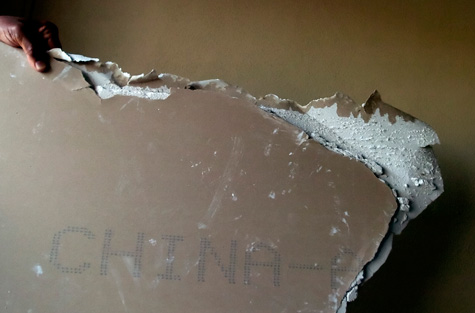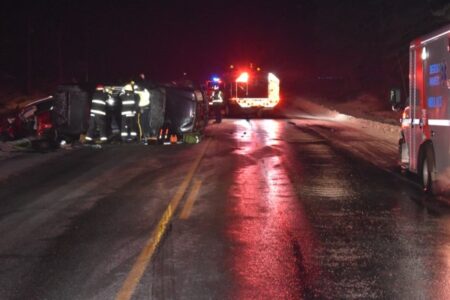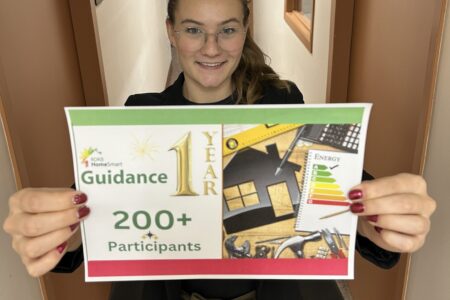Tainted Chinese Drywall Concerns Went Unreported for Two Years
by Joaquin Sapien
A leading East Coast homebuilder learned four years ago that the Chinese-manufactured drywall it had installed in several Florida homes was emitting foul odors, according to documents obtained by ProPublica and the Sarasota Herald-Tribune.
The company, WCI Communities, was so concerned that it started planning to tear out the material and rebuild the houses. But it never disclosed the problem to the bulk of its customers or to government authorities.
The drywall problem didn’t attract much attention until late 2008 — two years after WCI first spotted the problem — when dozens of Florida homeowners complained to state and local officials about bad odors, serious respiratory problems and mysterious failures of new appliances. The foul air, homeowners ultimately discovered, had destroyed their air-conditioners, corroded wiring, and disabled dishwashers, computers and televisions.
By then, tainted Chinese drywall had been installed in thousands of homes. As of today, the Consumer Product Safety Commission — the lead federal agency in the drywall investigation — has received complaints from more than 3,300 homeowners in 37 states, with many coming from Florida, Louisiana and Virginia.
Documents and sworn depositions from ongoing lawsuits reveal that senior officials at WCI were worried as early as 2006 about the potential health effects of the odor. The documents show that these concerns were shared by the Chinese company that made the drywall and exported it to the United States. “It will be a big problem not only in Miami but all over the USA market, maybe cover thousand (sic) of houses,” a Chinese employee of the manufacturer wrote in a November 2006 e-mail to his bosses in Germany.
This e-mail is part of a series of exchanges that involved companies at many levels of the building process: the developer, Bonita Springs-based WCI; the drywall distributor, Miami-based Banner Supply; the Chinese manufacturer, Knauf Plasterboard Tianjin Co. Ltd.; its Germany-based corporate parent, Knauf; and the Florida importer, La Suprema of Miami.
For reasons that are not clear in the documents, none of these companies sought to assess whether the problem was more widespread than the handful of complaints that had surfaced in Florida. None informed their customers or regulators.
The drywall manufacturer, Knauf, struck a private settlement with Banner in January 2007, agreeing to replace the remainder of the suspect shipment with American-made drywall. Knauf conducted its own tests and determined that the material, though smelly, was not hazardous.
WCI, which recently emerged from bankruptcy, didn’t respond to questions about its handling of the drywall problem. A WCI spokeswoman said only that the bankruptcy filing wasn’t related to the drywall problem.
When ProPublica and the Herald-Tribune contacted Jack Landers, head of Banner Supply, Landers said he would “not talk about it now” and hung up the phone. A call to another top Banner executive went unreturned.
The publicly listed phone number for La Suprema is no longer in service. Neither is the owner’s cell phone number that is listed in court documents.
Knauf has said that the cause of the problem was gypsum with a high sulfur content extracted from mines in the Shandong region of China, though it has offered no proof of that. Gypsum is the primary ingredient in drywall. Donald Hayden, a lawyer for Knauf and its Chinese subsidiary, said the company didn’t think the odors alone were enough to trigger a more widespread investigation or alert its other customers around the country.
“Our concern was with regard to the health of the homeowners,” he said.
Ervin Gonzalez, the attorney for plaintiffs suing Banner and other companies in a Miami lawsuit, said Thursday that a trial in June will at its core be “a public safety case.” Gonzalez alleged that Banner had all the knowledge it needed to raise the alarm in 2006.
“We have a distributor that could have been a hero by letting everyone know it’s a problem,” Gonzalez said. “Instead, when they found out it was potentially dangerous, they didn’t tell their customers or consumers about it. That’s just wrong.”
The Consumer Product Safety Commission recently issued guidelinesadvising builders and homeowners to remove Chinese drywall, which means that the affected homes will effectively be gutted. The agency said the electrical systems in the homes should also be removed, because they may pose a fire safety risk. The foul air, homeowners have learned, contains sulfur gas that can corrode wiring and damage electronic equipment. The health effects of the air are still being studied.

Dory Josephson shows the industrial respirator she is forced to wear as a result of the Chinese drywall in her home in the Venetian Golf and River Club in North Venice, Fla., on Friday, May 20, 2010. (Chip Litherland / Sarasota Herald Tribune)
As WCI, Knauf and Banner were trading e-mails about the drywall problem in 2006, Dory Josephson and her husband were settling into their new WCI home in the Venetian Golf & River Club, south of Sarasota. About a year after they moved in, their air conditioner failed. By fall 2008, Dory Josephson’s breathing was strained, her eyes were burning, and she was having severe headaches. Within a two-month period, each of their smoke detectors mysteriously went off and then stopped working.
When the Josephsons and their neighbors first asked WCI what could be causing their problems, company employees told them they had no idea, even though WCI officials already knew there was a problem with drywall in another of its Florida developments.
Last year, Josephson starting wearing an industrial respirator inside her house.
“We worked over 37 years and we put our entire savings into this home,” said Josephson, who is among the thousands of homeowners turning to the courts for help.
The e-mails and other documents obtained by ProPublica and the Sarasota Herald-Tribune show that WCI began investigating complaints about foul odors in homes it had built on Florida’s southeast coast as early as July 2006. By October, WCI had determined that the drywall was to blame and began demanding answers from Banner, the company that sold it the drywall.
A Banner employee who signed his e-mails “Ed” sent Banner executive Donald Coblentz a frantic e-mail on Friday, Oct. 27, saying that Knauf, the drywall manufacturer, needed to be notified that “we have a problem with a very bad smell comming (sic) from there (sic) board.” A test at one home showed Knauf wallboard “had 20 times stronger smell then (sic) all the other board,” Ed said.
That e-mail also went to Salomon Abadi, chief executive of La Suprema, the company that had brokered Banner’s purchase of the Knauf board.
Four hours later, Abadi wrote back asking for “more details” to share with Knauf. By Monday, the correspondence indicates that Knauf was planning to send inspectors to South Florida to assess the situation.
On Oct. 30, Banner received a letter from one of its customers, installer Beta Drywall, saying that Beta would no longer accept Chinese-manufactured drywall “based on recent direct instructions from the majority of our builders and general contractors.”
Gus Coffinas, a Banner executive, wrote a note at the bottom of the letter before passing it on to his colleagues. Beta’s concerns were “typical of what’s going on now,” he said. “Everybody now is getting picky about the board manufacturer of the product. It makes sales more challenging.”
Coffinas added: “PS, all our competitors are having a field day with this.”
On Nov. 2, Banner’s Coblentz sent an e-mail to USG Corp., a major U.S. drywall manufacturer partly owned by Knauf, saying he had a “big problem.” USG’s supply houses in the U.S. distributed large quantities of Knauf’s Chinese-made product.
Coblentz said that WCI and another Florida builder, GL Homes, were “forcing me to take board that is stocked in houses out and replace it with domestic.”
“These companies are threatening to take all the drywall down in all the houses that are partially completed and ALL the houses that are hung & completed and replaced,” Coblentz wrote. “They are talking about removing people from their homes and putting them up in hotels and redoing all these houses.”
He pleaded for someone from Knauf to contact him right away. “Every day is getting nastier,” he said.
On Nov. 3 another drywall installer, Distinctive Drywall Designs, sent WCI a certified letter asking if WCI still wanted the drywall removed from its homes, as it had indicated previously.
Scott Thoms, Distinctive’s president, said he had notified both Knauf and Banner about WCI’s complaints. Thoms asked that WCI send “all evidence supporting your findings so that we may take immediate corrective actions to rectify the problem.”
“Please advise if drywall removal is the course of action you still wish to pursue,” Thoms wrote.
About this time, Knauf Tianjin, the Chinese division of Knauf that manufactured the drywall, assigned an inspector, Mark Norris, to investigate the problems in South Florida.
Norris told Abadi, the chief executive at La Suprema, to directly contact USG, the American drywall company that’s partly owned by Knauf. On Nov. 6, Abadi — a native Spanish speaker — sent his USG contact a long e-mail in broken English begging for information and help.
Abadi said WCI had conducted environmental tests, but refused to share them. Abadi said he was having “a very dificult [sic] times with the builders.” They are “forcing us to take back the board and they want to demoliosh [sic] the drywall that is hung, take the people out of the houses.”
“I need your help,” Abadi wrote. “This is getting out of control.”
Abadi said he needed WCI’s report and an expert in Miami to explain the situation. He said he would “pay all the expenses if is (sic) necessary but we need to control this problem in the next 24 to 48 hours max.”
E-mail correspondence shows that by that time Knauf officials in Germany had joined the discussion. Drywall samples had just been shipped there for testing, and the head of Knauf’s research division, Hans-Ulrich Hummel, was arranging to fly to Florida. Hummel said he had detected a “sweet smell” from a drywall sample sent to him.
According to Abadi’s sworn deposition in the recent litigation, Hummel arrived in Florida sometime between October and December 2006 to examine the drywall in several Broward County homes. Abadi said he was led to believe that Hummel was “one of the greatest scientists in the world, in the drywall business.”
Abadi said he, Hummel and a Banner employee walked into a house, smelled it, and walked back out. Then Hummel left, saying he would talk to Knauf’s owner and send more technicians. Soon Norris, the Knauf inspector from China, arrived and he and Abadi visited more homes. Asked in his deposition for details about the testing, Abadi said he recalled people walking into the homes “with these immense Ziplocs, putting the watchamacallit, the drywall, in to carry out the tests.”
On Nov. 11, Lan Wang, the Knauf employee in China, warned Norris that the problem could spread beyond Florida into other parts of the company’s U.S. market.
Two days later, Norris faxed a letter to Abadi, telling him to stop selling or installing Knauf drywall. Norris also forwarded the letter to Banner.
According to a Banner official’s sworn testimony nearly four years later, Banner didn’t alert any of its other customers — which included builders and suppliers across Florida — that the drywall was problematic.
Scott Giering, a Banner executive, testified that although the company stopped selling Knauf board, it continued selling other brands of Chinese drywall and took no steps to determine whether they too had problems. Some of those boards turned out to be just as bad as the Knauf product.
By the end of November 2006, Knauf had retained an attorney — Douglas Sanders at Baker & McKenzie’s Chicago office — who continues to represent the company. On Nov. 29, Sanders e-mailed Coblentz at Banner Supply. Attached was a letter from Norris, the Knauf inspector, to Abadi.
Norris told Abadi that Knauf “appreciates your bringing to our attention the concerns of your customers over the smell” of the company’s drywall. He also told him that Knauf had hired an Arkansas company to test the air in the homes and was “pleased to report” that there were “no health risks.” He included a copy of the report.
In the letter Norris downplayed the odor problem, saying that a sample he sniffed simply “smells like the plasterboard made from natural gypsum in China and much of the plasterboard Knauf Tianjin manufacturers every day.”
Abadi never heard from Knauf again.
“After that, I didn’t know anything more from them,” Abadi said in his testimony.
The flurry of e-mails among Banner, WCI and the other companies stopped at the end of 2006. In January 2007 Banner and Knauf signed their confidential agreement.
Hayden, the Knauf attorney, said in an interview that the agreement involved replacing 200,000 square meters of Knauf’s Chinese-made board with American drywall. He said it also included strict confidentiality provisions and was written to keep the companies from suing each other.
A Miami-Dade circuit court judge is scheduled to hear arguments for unsealing that agreement on Wednesday, Hayden said.
The courts are now trying to determine who is responsible for paying to repair the contaminated homes. In Louisiana, the federal judge who is overseeing the combined drywall lawsuits recently ruled in two test cases that Knauf should pay to remediate one house and that another Chinese drywall manufacturer should pay to remediate seven houses. Knauf hasn’t yet decided whether to pay the judgment or force the plaintiffs to collect the money in China, said Hayden, the company’s lawyer. American verdicts are rarely honored in China.
In a sworn deposition for the upcoming Miami drywall trial, Banner executive Scott Giering said his company didn’t know there was a problem with the drywall until it got complaints from WCI. But Giering refused to acknowledge that the contaminated drywall and the conditions it creates are problems.
“One person’s problem is another person’s opportunity,” Giering said.
In one exchange, Coral Gables attorney Ervin Gonzalez asked Giering, “If you had drywall in your house and you had to replace it all, that would be a problem for you, wouldn’t it?”
“I’m not sure what you would define (as a) ‘problem,'” Giering said
When Gonzalez compared the smell to rotten eggs, Giering responded, “Some people happen to like rotten egg smells.”
When Gonzalez asked, “Smells like flatulence, doesn’t it?” Giering replied, “Some people happen to like that.”
“Do you?” Gonzalez asked.
“Depends on how nasty it is,” Giering responded.

Jim Silverblatt, who owns a home that was built with tainted Chinese drywall, poses for a portrait in the Venetian Golf and River Club in North Venice, Fla., on Friday, May 20, 2010. (Chip Litherland / Sarasota Herald Tribune)
Last week, the Josephsons and other WCI homeowners in the Venetian development gathered at the home of Susan Lamar to share their travails.
Lamar, an oral surgeon, had just drained her 175-gallon aquarium — there was so much sulfur gas in her house that the coral wouldn’t bloom. The $20,000 reef tank now sits empty in her living room, which smells faintly of chemicals.
The Josephsons have begun remediating their home on their own. After paying more than $600,000 for the house in 2006, they’ve already spent at least $100,000 to tear out their wiring and drywall and replace it with an American brand.
Jim Silverblatt, another neighbor, said WCI told him in early 2009 that his house would be remediated as part of the reorganization plan the company had submitted through the bankruptcy court. But so far that hasn’t happened.
“They said they would take care of me,” he said. “Then that summer I find out I’m just another unsecured creditor, that it’s over, they’re not lifting a finger.”
A Deerfield Beach-based real estate analyst said WCI’s failure to publicly disclose the drywall problem in 2006 — and the fact that the company continued selling homes at full market price without warning buyers that they could contain defective drywall — may hurt WCI’s reputation as it tries to reinvent itself after emerging from bankruptcy.
“It’s obviously immoral and unethical,” said the analyst, Jack McCabe. “Whether it’s illegal, that’s a question for the lawyers.”
This article originally appeared in ProPublica.























Comments